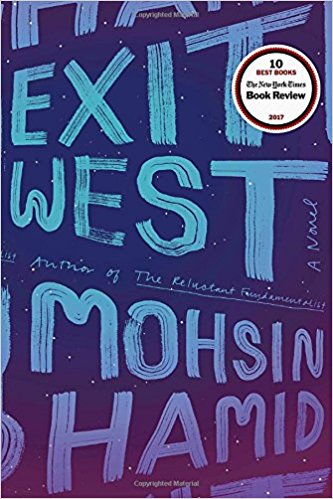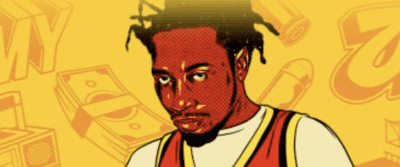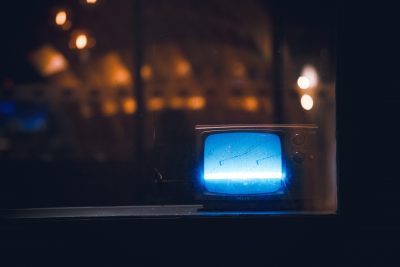Interview with 2018 NBCC Fiction Award Finalist Mohsin Hamid
For the past four years, the National Book Critics Circle has partnered with The New School’s MFA Creative Writing program, allowing the students to interview each of the NBCC Awards Finalists. In addition to building excitement for the Awards Finalist Reading and Ceremony held at the New School March 14th-15th, these interviews have built an intergenerational bridge between the writers of today and tomorrow.
This year, as part of the ongoing collaboration, and in support of the NBCC’s conversation about reading, criticism, and literature that extends from the local to the national, Brooklyn Magazine will publish and promote the interviews between NBCC Finalists and the current students of The New School.

In a way, Exit West (PenguinRandomhouse) is nothing like Mohsin Hamid’s previous books. Yes, it follows the intimate relationship of two brown lovers, Said and Nadia. Yes, its setting is a failed state, and in a larger sense, a failed world. But Exit West tells a story of refugees with such compassion that I couldn’t help but wonder where Mohsin’s grit, cynicism, moral complication were. And then later, once my writer-of-color paranoia hit in I also wondered who these likable Muslim characters were performing for—if anyone.
It is this paranoia that is at the heart of my questions for Mohsin Hamid: the little voices in my head that want to depict the good without being apologetic, the bad without feeding into stereotypes, all the while wanting the freedom to write for oneself. Perhaps because of Hamid’s humanist politics or perhaps because of his belief in a kind of spiritual unity or a maturity of age, Exit West found the answer to these questions.
I was surprised by the narrative voice of Exit West. It is straightforward, reliable. You said that it was inspired by the tone of children’s books, so I’m even tempted to say that it’s naive. Is that a reaction to the cynical political climate, or is it a personal trajectory of yours?
I think both. My first novel, Moth Smoke, has cynical characters, an untrustworthy narrator, all sorts of corruption: personal, political, and emotional. It was a reaction to growing up in Pakistan in the 1980s, a supposedly Islamized and pure place. I wanted to show it as the opposite. But I do think that in this moment, politically speaking, truth and honesty have become debased and denied. I wanted to write something that tries to be true, with characters that are trying to be decent.
But it might as well be personal. I’m 46 years old, I have two kids, I have been writing novels for 25 years and living with my family in Pakistan where I am the middle generation: my parents the older ones, my kids the younger ones. I think I have been looking personally, for myself and in my own life, at these sorts of issues. What sort of person should I be and how should life be lived? I think as a father and also as a son I’m trying to figure that out. In some senses I’m looking at older forms. Not just children’s books, but for example, I’m re-engaging with ideas in Sufi literature, or Zen thought. I’m trying to look at traditions of older wisdom and investigate if there is something useful there for me. Something that can be described as not specific to one religion but open to everybody.
You talk about writing decent characters, but decency is not a neutral term. What constitutes decency for you, and as a writer, how is the experience of constructing decent characters different than the morally questionable characters of your previous books?
Well, I think that decency is not necessarily a state that a character inhabits, so much as an orientation that they value. Said and Nadia are not perfect human beings, they do things which they each individually regard as potentially wrong – for Said leaving his father in the novel is something that he doesn’t know if it’s the correct thing to do. So it’s not that people are fundamentally decent or indecent, but rather the impulse towards decency is an important impulse to take seriously. And many people do. This is why even in situations of enormous ethnic tension or political pressure we have people not behaving violently. The story of humanity is not the story of genocide and murder it’s the story of so many genocides and murders that do not happen, because decency holds. It doesn’t mean that their sense of decency is the correct one, but it’s something of meaning to them. This notion is almost old-fashioned. But it’s something I’m interested in because I think this old notion is actually true of many and for most people much of the time.
If we write only of characters who feel no strong compulsion towards decency, then we are only writing about one facet of humanity. I’ll give you an example of this. My daughter likes to write songs. She’s eight years old, she plays the guitar, and often she’ll be singing something like “From the center of my loneliness… I can see the darkness…” And I asked my daughter, she’s a very happy kid, “What is up with all these dark lyrics that you’re writing?” And she said, “Baba, happy stuff is really difficult to write, and also the dark stuff just sounds better.” When I was younger, the inclination to explore the darker side of oneself was very strong, and I’m not sure if it’s because I thought it was easier to write, or if I thought it sounded better. But at this point for me I am interested in the exploration of the other side. Unless we reckon with the potential for goodness, seriously, then we end up leaving on the table a big part of human capacity. And if literature doesn’t reckon with this then I think we’re failing culturally as a society.
I really admire your female characters, how independent and strong-willed they are, some would say “liberated.” What is your approach to writing female characters?
The nicest thing I’ve heard about Exit West recently was a woman who said that she kept feeling as if it was written by a woman. And that was an interesting thing for me to hear, because what does it mean for something to be written by a woman or by a man? For her, the main character was Nadia and the sensibility of the book, the way it approached certain issues, was a way that she associated with woman-ness. I was really touched by this remark, in the same way that if you were writing about America, or California, or Albany, NY, and somebody would say “Wow I really felt that this was written by somebody from Albany,” then it is quite a generous comment. So when I write a female character, I imagine being a woman, and more than being just a woman, I imagine being that woman. For me writing characters is about imaging being specific people. What’s it like not just to be a woman, but a particular woman, a singular woman, an individual woman.
My approach to that comes from the fact that I have been surrounded by women my whole life. [I have a] very strong matriarchal family. But of course there is a political dimension to being a man writing a character who is a woman, and I’m aware of that. I tend to try to write characters who are both liberated and not at the same time, as we all are. Nadia in some sense is liberated in other ways she isn’t, to herself. Same is true for Mumtaz from Moth Smoke. I’m also interested in the ways in which men can be strong by having characteristics we are told are female, like gentleness, being nurturing. Said, for example, is a gentle man. But it takes incredible strength to be gentle in the way that he is in the circumstances that he finds himself in. It takes less strength to not be gentle. In this way these two characters are both strong but in different ways, and each are me imaging myself to be a different person.
The part of the book when Nadia and Said arrive in London is very interesting. First you envision the refugees occupying the wealthy neighborhoods of Kensington and Chelsea, and then later, the characters find themselves bonded in a labor camp. Are you saying something about border divisions being based not just on nationality, ethnicity and religion – but primarily on class?
I think it is very much based on class. I think what we are seeing in the world today is that there is a cosmopolitan class. By virtue of education, wealth, social connections, cultural capital, whatever, it is able to move fairly effortlessly around the world and be exempt from the rules that apply to people who don’t have these benefits. Kensington and Chelsea in London are very largely owned by foreigners, but because they are wealthy, we don’t hear much in the way of protest about it. So I think there is a class component to all of this.
There is an alliance which we see in the center left, for example, between incredibly wealthy cosmopolitan people – many of whom who are quite opposed to regulations or government intervention that would improve conditions of those who are not wealthy – and other people who themselves are not wealthy but believe protection of the rights of immigrants and minorities, equality of gender and sexual orientation, etc. I believe that this an unsteady alliance because it’s difficult to ally with somebody who does not believe in equality to pursue equality. This kind of billionaire alliance with minorities, women, queers, etc. is an unstable alliance.
So the novel, yes, does explore this aspect of how it all does with class. I think the class connections in the current populist backlash shouldn’t be ignored. I think that for example, in American politics, there is a very strong racial undercurrent at play [and] a strong class element at play as well, to the extent that the Democrats have failed to help people of working and middle class backgrounds. Had more work been done to help people of working and middle class backgrounds by the Democrats then they might have been able to bridge, or lessen some of the racial elements that Trump has exploited.
How has your idea of readership changed over time and with your international success?
I think living in Pakistan in particular, I no longer imagine that readers will approach novels in the same way that I imagined when I lived in New York or London. Myself and a lot of my friends who are writers went to similar universities, and had a particular interpretive apparatus that we brought to reading fiction. But I now believe that I need to write novels that contain within them the equipment needed to decode themselves. Too many readers don’t exist in a world of critics or reviews or literary culture. In fact, almost no readers exist in that world. So I’m trying to write novels that can be understood by people regardless of their background, it’s important to me. It doesn’t mean writing simple novels, or avoiding difficult issues, or writing simple sentences, or anything like that. I just have to put in the book what is required to make sense of it. You don’t have to read other books to read this book. I meet many readers in Pakistan who will say that one of my novels is the only novel that they’ve read.
The novel is a uniquely powerful form because it is a mode of communication between two individuals, one writer and one reader, each both composed and received in solitude. A reader while reading a novel contains the thoughts of two human beings inside of him, their own and the writer’s, and at that moment the reader is not just one person, they are a kind of hybrid being. I think this is a magical, incredible, fertile, beautiful, powerful relationship. I believe in the novel. That’s why I believe in opening it up to any reader. I don’t really have a reader in mind because all people are different from each other. I try to write books that I would like, and I try to write them in a way that they build a relationship with a human being in the course of the telling.
So when you know that someone like Barack Obama, who has concrete power over the fate of refugees, has read Exit West, it doesn’t change the way you write?
I was very happy that [Barack Obama] liked my book. Happy is an understatement. I was quite thrilled, really. But as a reader he is no more or less important to me in thinking how to create a book than any other reader is. The novel impacts the policy reader not as a vehicle of policy, but by touching the human being. If the human being who is the policy maker has been touched, then the novel has done something. But not because I’ve advocated a policy, but because I’ve touched a person. Barack Obama is no different than any other reader. He’s just a human being to be touched.
Finally, I want to ask about drugs, they seems to be a recurring theme in your books.
Let us just say that I have considered them significant, and that there is an ancient tradition of intoxication in literature, particularly in the literature of South Asia, in the Sufi form as well as others. Intoxication is a moment in which the self begins to change shape and become something else and it’s a very interesting and fertile domain to be explored in literature, and not unrelated to the experience of writing and reading itself. There is an intoxicating quality to reading and writing, and in it the self can shift.
You might also like 


























